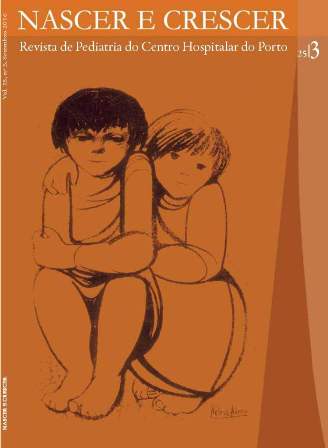MUSICEMBRIOLOGY IN CHILDREN EURODEVELOPMENT: A REVIEW
DOI:
https://doi.org/10.25753/BirthGrowthMJ.v25.i3.10079Keywords:
music, pregnancy, child, neurodevelopmentAbstract
Introduction: Musicembriology is music listening during pregnancy, in order to improve maternal-fetal relationship and child neurodevelopment. However, their relationship is not well established, so it remains a controversial issue.
Objective: Review of the available evidence on the impact of music listening during pregnancy on children’s neurodevelopment.
Methods: Meta-analysis research, systematic reviews, randomized controlled trials, and standards of clinical orientation, in English and Portuguese languages, published between 01/2004 and 04/2014, on the basis Pubmed / Medline, medical sites based on evidence and Portuguese Index of Medical Journal, using the MeSH terms: music; pregnancy; child; neurodevelopment. For the assessment of levels of evidence (NE) and award recommendation forces (FR) scale SORT was used (Strength of Recommendation Taxonomy) of the American Family Physician.
Results: Eleven articles were found, four of which were selected: three randomized controlled trials and one systematic review. A randomized controlled trial (NE 1) showed significant improvement in neonatal behavior in children whose mothers listened to music during pregnancy. A randomized controlled trial (NE 2) showed an improvement of maternal-fetal relationship with musicoembriology. Another randomized controlled trial (NE3) and a systematic review (B FR) showed that the intrauterine environment is important in the neonatal brain development, especially the development of the motor and sensorineural cerebral cortex.
Conclusion: The available evidence showed that music listening during the embryonic period shows benefit in children’s neurodevelopment. (FR B) However, those obtained studies are few in number and have great heterogeneity in methodological terms. Further studies are needed with controlled populations and similar methodology for the overall recommendation of this measure
Downloads
References
John Miles. Music was my first love. Track no. 1 on Rebel. London: DECCA Record Company, 1987.
Kim CH, Lee SC, Shin JW, Chung KJ, Lee SH, Shin MS, et al. Exposure to Music and Noise During Pregnancy Influences Neurogenesis and Thickness in Motor and Somatosensory Cortex of Rat Pups. Int Neurourol J 2013; 17: 107-13.
McMahon E, Wintermark P, Lahav A. Auditory brain development in premature infants: the importance of early experience. Ann N Y Acad Sci. 2012; 1252: 17-24.
Graven S, Browne J. Auditory Development in the Fetus and Infant. Newborn Infant Nurs Rev 2008; 8: 187-93.
Ullal-Gupta S, Vanden Bosch der Nederlanden CM, Tichko P, Lahav A, Hannon EE. Linking prenatal experience to the emerging musical mind. Front Syst Neurosci. 2013; 7: 48.
Lai R. Wagner of the womb – Does pre-natal music stimulation affect the intelligence of a fetus? Scientists are understanding whether music affects brain development early on before birth. Neur306 Principles of neural development. 2011.
Arya R, Chansoria M, Konanki R, Tiwari DK. Maternal Music Exposure during Pregnancy Influences Neonatal Behaviour: An Open-Label Randomized Controlled Trial. Int J Pediatrics. 2012; ID 901812.
Arabin B, Jahn M. Need for interventional studies on the impact of music in the perinatal period: results of a pilot study on women`s preferences and review of the literature. J Matern Fetal Neonatal Med. 2013; 26(4): 357-62.
Downloads
Published
How to Cite
Issue
Section
License
Copyright and Authors' Rights
All articles published in Nascer e Crescer - Birth and Growth Medical Journal are Open Access and comply with the requirements of funding agencies or academic institutions. For use by third parties, Nascer e Crescer - Birth and Growth Medical Journal adheres to the terms of the Creative Commons License "Attribution - Non-Commercial Use (CC-BY-NC)".
It is the author's responsibility to obtain permission to reproduce figures, tables, etc. from other publications.
Authors must submit a Conflict of Interest statement and an Authorship Form with the submission of the article. An e-mail will be sent to the corresponding author confirming receipt of the manuscript.
Authors are permitted to make their articles available in repositories at their home institutions, provided that they always indicate where the articles were published and adhere to the terms of the Creative Commons license.


